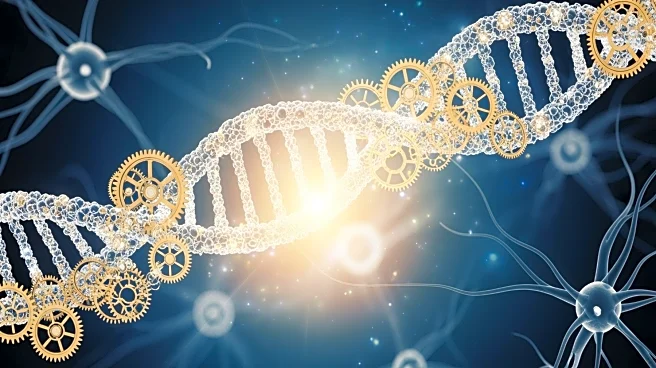What's Happening?
A recent study has explored the transcriptional changes associated with long-term memory (LTM) formation in Drosophila melanogaster, focusing on the mushroom body (MB), a critical memory center in the fly
brain. Researchers conducted a transcriptome time course analysis, isolating nuclei from the MB and performing RNA sequencing at various time points during and after courtship LTM training. The study identified differentially expressed genes, categorized as training-induced or training-repressed, and highlighted the MB-specific transcriptional trace of courtship LTM. The analysis revealed significant gene expression changes, particularly in the MB, during the late stages of training and early post-training periods, which are crucial for memory consolidation. The study also identified essential transcription factors, such as Hr38 and Sr, which are potentially involved in shaping the transcriptional response to LTM training.
Why It's Important?
Understanding the molecular mechanisms underlying memory formation is crucial for developing treatments for memory-related disorders. This study provides insights into the transcriptional dynamics of memory formation, highlighting specific genes and transcription factors that play a role in LTM. The identification of MB-specific transcriptional traces and the involvement of transcription factors like Hr38 and Sr could lead to targeted therapies for conditions such as Alzheimer's disease and other cognitive impairments. Additionally, the study's findings contribute to the broader understanding of how experiences are encoded in the brain, potentially influencing future research in neuroscience and cognitive science.
What's Next?
Future research may focus on further elucidating the roles of identified transcription factors in memory formation and their potential as therapeutic targets. Studies could explore the application of these findings in mammalian models to assess their relevance to human memory processes. Additionally, researchers might investigate the interaction between these transcription factors and other molecular pathways involved in memory consolidation. The development of genetic or pharmacological interventions targeting these pathways could offer new strategies for enhancing memory and treating cognitive disorders.
Beyond the Headlines
The study's approach to isolating and analyzing MB nuclei provides a model for investigating other complex brain functions and their molecular underpinnings. The findings also raise questions about the ethical implications of manipulating memory-related genes, particularly in the context of enhancing cognitive abilities or altering memory processes. As neuroscience advances, discussions around the ethical use of such technologies will become increasingly important.








